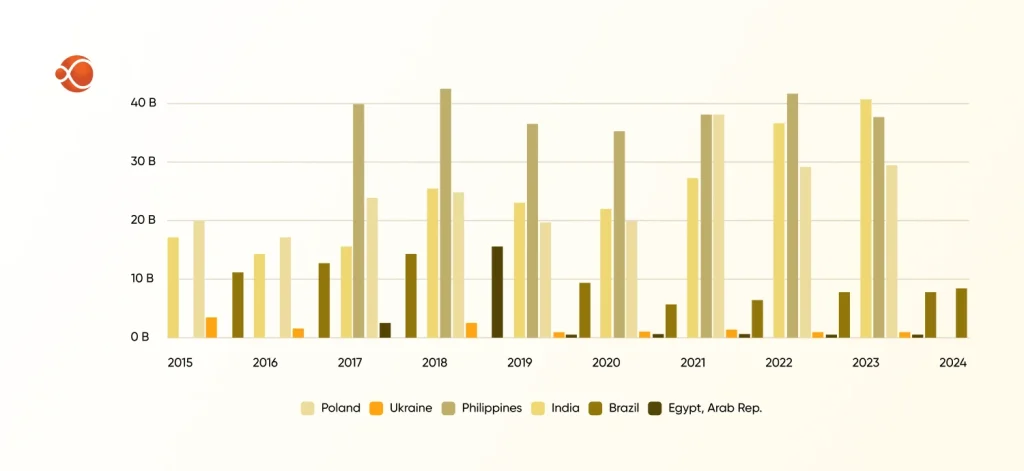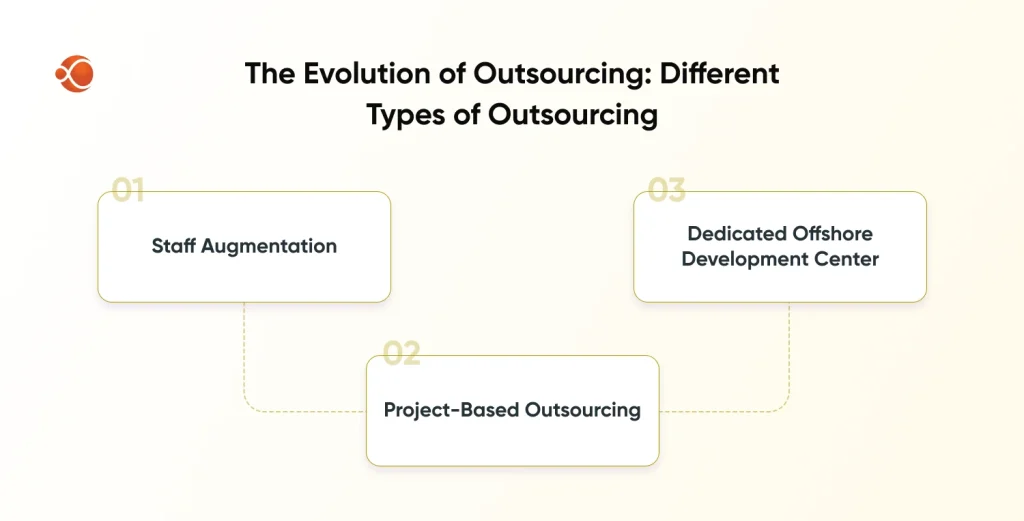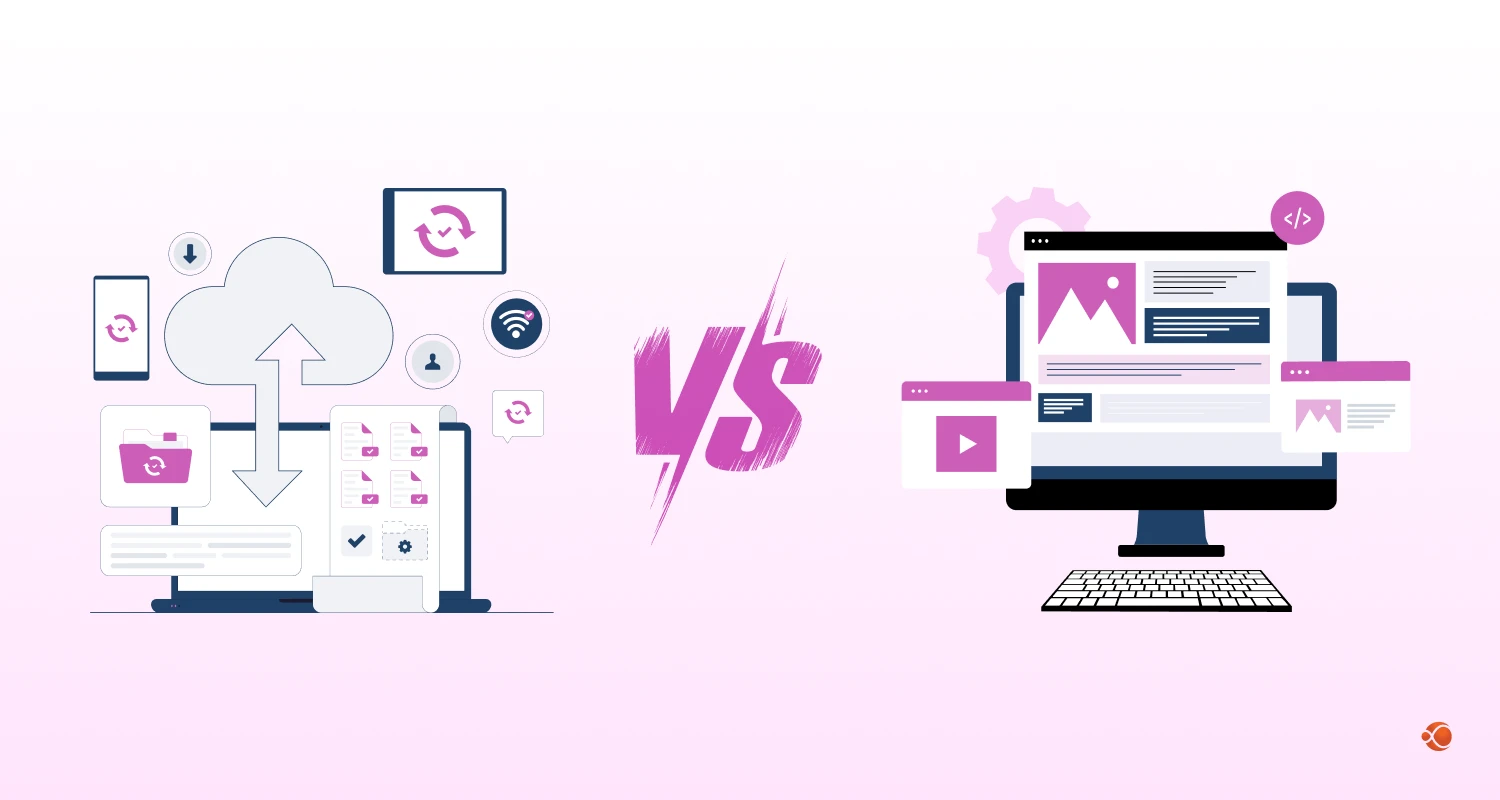Quick Summary: How are enterprises scaling faster without having to compromise quality? They are shifting their focus towards offshore engineering teams that bring global expertise, new-generation technology, and flexible collaboration models. From IT operations to eCommerce development, offshore collaborations are opening gates for global teams.
When growth is on the line, every decision matters. Enterprises that once relied solely on in-house teams are now looking outward, and with good reason. Offshore engineering teams have become a proven strategy for scaling fast, unlocking specialized expertise, and meeting aggressive timelines, without compromising on quality. But what is it that is driving such a shift and turn to the offshore outsourcing model? Is it simply cheaper labor, longer working hours, or the appeal of round-the-clock delivery?
The truth goes beyond that. What leading enterprises have discovered is a more profound advantage: offshore data engineering teams provide access to specialized skills at scale, they diversify problem-solving approaches through global talent, and create an operating model that is more agile. The role of offshore engineers is no longer limited to filling gaps; it has evolved to encompass a broader range of responsibilities. It is about building a system that adapts, innovates, and accelerates in ways that traditional models cannot.
Understanding The Impact: The Current Global Offshore Landscape
The Rise of Offshore IT Teams

High-technology exports presented in this Worldbank report reflect not just manufacturing capabilities, but also the depth of innovation ecosystems that offshoring countries like India, Poland, the Philippines, and others are building. The graph showcases a consistent rise across several emerging IT economies, reflecting how offshore engineering and technology services are shaping the global market.
Offshore destinations are no longer just cost-saving alternatives; they are becoming innovation hubs that drive billions in global high-technology trade. The competition for outsource app development ranges from Asia, Eastern Europe, and Latin America, where enterprise outsourcing is no longer tied to a single geography.
The Global Offshore Software Development Market
The offshore software development market is expected to reach a valuation of $151.9 billion by 2025, with large enterprises accounting for 60% of that revenue. This highlights the importance and reliance of enterprises on offshore teams to meet their technical demands.
Core Benefits of Offshore Software Development for Enterprises
Enterprises today must grow quickly while ensuring quality. Most offshore engineering teams, whether for data, app, or eCommerce development, offer a smart solution.
1. Enhanced Innovation and Problem-Solving
Working with offshore engineering teams brings a diverse range of cultural perspectives to the table. This opens up room for new thinking and fostering innovation with problem-solving. The varied backgrounds and experiences of offshore engineers can be a great asset to finding new solutions or approaches to a problem you’ve been stuck on for ages.
2. Access to Advanced Technologies
Offshore developers from emerging markets, such as India and Ukraine, are more proactive in learning about new technologies. Most of these countries and individuals are already making notable progress in the fields of AI, machine learning, blockchain, and IoT, building some promising future-ready applications.
3. Risk Mitigation
Offshore models help mitigate risks, such as system failures during peak demand or not finding the right talent locally. Enterprises that work with a staff outsourcing agency in India, Ukraine, or other offshore locations witness major improvement in business continuity and resilience.
Industries Benefiting from Offshore Engineering Teams
| Industry | Key Offshore Engineering Solutions |
| eCommerce | Build scalable online platforms with the expertise of an offshore eCommerce development team. Implement AI-driven product recommendations and personalization. Integrate secure global payment gateways and multi-vendor features. |
| Fintech | Develop modern digital banking and payment platforms to enhance financial services. Ensure strict compliance with financial regulations across all solutions. Utilize blockchain technology to maintain secure and transparent transactions. |
| Healthcare | Build telemedicine and remote patient monitoring systems for improved healthcare delivery. Implement AI-powered diagnostics and predictive analytics to support clinical decisions. Deploy HIPAA-compliant healthcare systems with advanced data security. |
| Automotive | Create connected car software and mobility applications for enhanced user experiences. Integrate IoT solutions for fleet tracking and optimized logistics management. Implement AI-driven predictive maintenance systems to improve vehicle performance. |
| Telecom | Develop 5G infrastructure and cloud network solutions for next-generation connectivity. Deploy AI-powered customer support automation to enhance service efficiency. Ensure scalable global connectivity systems for enterprise communication needs. |
The Evolution of Outsourcing: Different Types of Outsourcing

Enterprises still believe in the holy grail of staff augmentation, but they are also moving forward from hiring offshore engineers as temporary fill-ins to long-term assets and partners. The choice of model for enterprise app development services depends on the enterprise’s need for control, clarity of the project scope, and desired commitment level. Here is the roadmap to outsourcing we have seen so far:
Staff Augmentation: The Flexible Fix
This is the simplest model, where enterprises bring offshore developers to temporarily filling seats or resource gaps within an internal team. It is also popularly referred to as the time-and-materials model, where the offshore engineer presumes the role of a contractor and reports directly to the client’s in-house manager. The client retains complete right over control and management oversight. This is generally ideal for short-term projects.
Project-Based Outsourcing: The Transactional Model
Here, the client wishes to outsource an entire project to the offshore vendor. This includes their planning, management, execution, and all requirements on a fixed price and timeline. This is an ideal way of offshoring engineering teams where the goal is defined from the outset. Here, the delivery and management is entirely up on the vendor.
Dedicated Offshore Development Center: The Strategic Goal
The dedicated development center is the enterprise-preferred model for long-term product ownership and continuous innovation. The vendor assembles a dedicated and integrated team of QA specialists, engineers, and project managers. They work exclusively for the client and act as a true extension of their development process. The client has the final say on strategic decisions, whereas the vendor handles all admin, HR, and infrastructure workload.
Real-World Success Outsourcing Engineering Stories
Ford Motor Company: Expanding IT and Customer Support Operations
Ford Motor Company has been outsourcing many functions to India. This includes software development, IT services, and even customer support. Initially, Ford outsourced back-office tasks like accounting, but eventually expanded to include software development services for e-commerce solutions. The company has invested over $5 million in setting up its project in India, and they have also moved their entire call center operations to offshore engineering teams in India.
WhatsApp: Initial Core App Development
WhatsApp is one of the most recognized and global messaging services today. It strategically outsourced its core application programming in its earliest phase. To build the foundational code quickly and manage costs, the company used external talent via freelancing platforms. This approach helped them build a small founding team that rapidly launched a working product. This laid the technical groundwork that led to its massive user, and an eventual $19 billion acquisition by Meta.
Microsoft: IT Operations and Cloud/AI Innovation
Microsoft primarily relies on global outsourcing to manage its large IT operational needs and accelerate its push into emerging technologies. The company partners with Indian firms to handle large parts of global IT services. They outsource technical support, help-desk functions, and way more to build smarter enterprises with AI.
BingeTV: AI-Powered OTT Platform Development Outsourcing
BingeTV, a leading OTT platform in Dubai, partnered with CMARIX for creating a web and mobile app capable of personalized AI recommendations. Offshore app developers at CMARIX, implemented machine learning algorithms that could analyse user behaviour for optimizing content suggestions, enabling the platform to scale its users rapidly.
Best Practices For Offshore Engineering Collaboration
| Best Practice | Description |
| Establish Clear Communication Channels | Utilize video calls, chat tools, and project management platforms to maintain transparency and alignment. |
| Define Roles and Responsibilities Clearly | Clearly outline each team member’s tasks to prevent confusion and ensure accountability. |
| Implement Agile Workflows | Utilize Scrum or Kanban methodologies to maintain visibility of progress, track deliverables, and facilitate continuous improvement. |
| Regular Progress Reporting | Conduct daily or weekly updates for monitoring milestones, identifying issues, and maintaining project momentum. |
| Cultural Awareness and Sensitivity | Understand and respect different cultures and their unique characteristics to foster trust and minimize miscommunications. |

Why Choose CMARIX to Build Your Offshore Engineering Teams
1. Access to Specialized Skills at Scale
Offshore engineering teams at CMARIX provide enterprises with access to a diverse talent pool. They possess specialized skills in areas such as artificial intelligence, blockchain, and cloud computing. This helps businesses undertake complex projects without being constrained by local talent shortages. Hire dedicated developers from us to build your future-forward, scalable team with a
2. Value For Money Without Compromising Quality
One of the primary reasons that enterprises opt for our dedicated offshore teams is value for money. The actual value of outsourcing lies in gaining access to specialized teams and individuals at significantly lower development rates. This allows such companies to allocate resources more effectively. For instance, offshore development rates in countries like India range from $20 to $50 per hour, compared to $50 to $100 in Sydney.
3. Faster Time-to-Market Through Follow-the-Sun Model
Offshore teams operate in different time zones because they are located in various regions around the world. What most businesses fail to understand is the day-to-day and overall benefit of this time zone difference. Your onshore team works from 9 to 5, and our dedicated offshore team works from 9 to 5, promoting a continuous development cycle. This “follow-the-sun” model ensures that the work progresses around the clock. This fastens the development process, providing quick-to-market solutions.
4. Scalability and Flexibility
CMARIX is one of the most reliable offshore engineering companies in India. We offer enterprises the flexibility to scale their operations up or down, based on the project’s needs.
5. Focus on Core Business Objectives
By outsourcing engineering tasks to offshore teams, business leaders and managers can better focus their attention on their core business competencies. Suddenly, the boardroom discussions shift to focus on marketing, customer engagement, branding, and other areas.
Final Words
Businesses of all sizes, industries, and locations are increasingly focusing on hiring or leveraging offshore engineering teams. The future of IT depends on cross-border collaboration, where offshore engineering teams work together with local teams to build smarter AI-driven solutions. Make sure to follow these best practices and benefits.
FAQs on Enterprises Outsourcing Offshore Engineering Teams
How to Build a Software Engineering Team Offshore?
Building an offshore engineering team starts with a clear definition of project needs. Next, you need to select a reliable vendor and hire the right talent with the needed technical skills. With strong technical skills, it is essential to focus on the developer’s ability to communicate effectively, collaborate in a team setting, manage agile workflows, and have a clear understanding of their role and responsibilities.
What Exactly Is an Offshore Engineering Team?
An offshore engineering team is made up of software developers and engineers based in another country, working remotely for a company. They serve as a remote extension of the in-house team, bringing exceptional skills, flexibility, and scalability to projects.
What Are the Main Benefits of Using Offshore Engineering Teams for Enterprises?
Offshore teams provide access to global talent, lower operational costs, and continuous development cycles. Enterprises also gain flexibility to scale quickly, speed up product delivery, and focus internal resources on core business priorities.
What Challenges or Risks Do Enterprises Face When Working With Offshore Teams?
Communication hurdles, time zone differences, and cultural gaps are among the primary concerns when it comes to offshore outsourcing. Risks can also arise from data security, quality control, and project misalignment if expectations are not managed properly.
What Best Practices Should Enterprises Follow to Manage Offshore Teams Effectively?
Set up effective communication channels, have clarity on end-goals, and find the proper quantifiable method to measure those goals. Use project management tools for better collaboration and visibility, and make sure to get regular updates from the global team, while ensuring cultural alignment and trust-building for a successful collaboration.
How to Choose the Right Offshore Partner or Vendor?
Choosing the right offshore outsourcing agency involves a proper evaluation of their technical expertise, industry experience, security practices, and client track record. Transparency, cultural compatibility, and strong communication frameworks should also guide the decision.
How Do Offshore Engineering Teams Help Reduce Time to Market?
Offshore engineering teams have access to a large pool of talent; hence, more developers can work on the project, or replacements can be found easily if need be. Since such teams operate in a different time zone, they take advantage of the time difference and provide parallel development, allowing you to clock more working hours towards your project in a day, thereby speeding up the delivery process.







